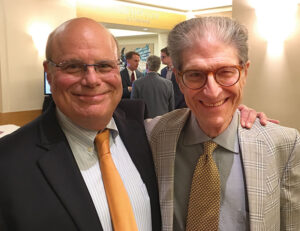Trying Times

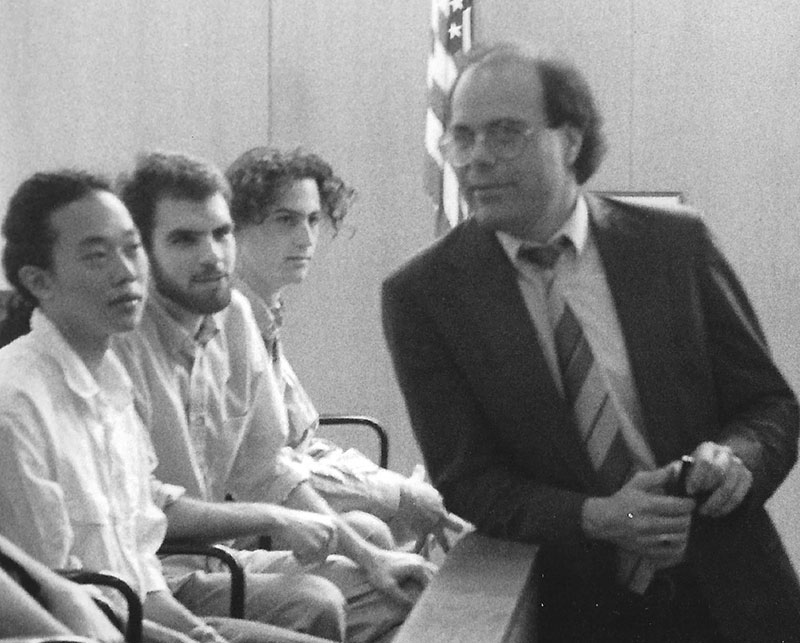
Title:Trying Times
Author: Terry Gilbert, with Carlo Wolff
Foreword: Lee Fisher
Genre: Memoir, Law, Civil Rights
ISBN:978-1-7331795-2-2
Format: 6″x9″ Hardcover
Publication Date:
February 1, 2021
Pages: 324
Price: $27.95
Terry Gilbert is a people’s lawyer.
His story begins during the late 1960s, when events at Attica, Kent State and Wounded Knee provided Gilbert with the impetus to use the law as a weapon in the fight for justice and equality.
For nearly 50 years, he has fought for civil rights, prison reform, police accountability, free speech and the American values enshrined in the Bill of Rights.
Since the 1970s, Terry has defended the rights of indigenous Americans and other disenfranchised people who have been cut out of the American dream. In the 1990s he successfully reopened the case against Dr. Sam Sheppard in an effort to finally clear Sheppard’s name and hold the justice system accountable. In 2014, Gilbert was able to secure the exoneration of Kwame Ajamu after serving 27 years in prison for a wrongful conviction, and he represented Ajamu’s brother Wiley Bridgeman, who spent almost 38 years in prison.
Gilbert believes that the law is a tool to use against injustice and in support of the highest ideals of America. Activism and diligence, he says, are the only things that can see the country through trying times.
Terry Gilbert has been in private law practice since 1973, focusing on criminal defense and civil rights litigation. At the start of his legal career, Gilbert represented American Indians in the aftermath of the Wounded Knee confrontation in South Dakota, and numerous anti-war and civil rights activists. Over the years, Gilbert has handled a variety of government misconduct cases involving police abuse, wrongful conviction, violations of free speech, prisoners’ rights, and victims of all forms of discrimination. His defense of civil liberties has often put him at odds with authorities and made him the target of op-eds and editorial cartoonists. At the same time, he has written many op-eds himself, and used the media to make his case for justice directly to the people. Gilbert lives with his wife Robin in a Cleveland suburb, and has two adult children: Benjamin, a molecular biologist, and Julian, a law student.
Carlo Wolff writes about popular culture, music, books, hospitality and travel. A contributor to the jazz magazine, DownBeat, he is the author of Cleveland Rock & Roll Memories, lead author of Mike Belkin: Socks, Sports, Rock and Art, and co-writer of Designing Victory and The Encyclopedia of Record Producers. Wolff also reports and edits for newspapers and magazines. A native of Dallas, Wolff grew up in Columbus, Ohio and attended schools in the Boston area. He moved to Cleveland in 1986. Wolff lives in suburban Cleveland with his wife Karen Sandstrom, a dog and a cat.
Trying Times in the News
Cleveland.com Op-ed
CLEVELAND — In the midst of the national conversation about police brutality and racial bias, especially after the murder of George Floyd, the national protests, and this week’s stunning guilty verdicts against Derek Chauvin, the legal doctrine of “qualified immunity” has been widely condemned as an impediment to achieving legal accountability against police who violate people’s constitutional rights.
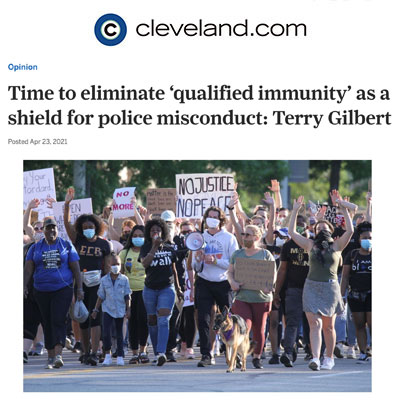
Cool Cleveland
If you need proof that the youth of the ’60s who protested the Vietnam War and took part in the Civil Rights Movement didn’t all mature to be Reagan conservatives, look no further than noted Cleveland lawyer Terry Gilbert.
Gilbert’s had an interesting career, to say the least. If his name sounds familiar, there’s a good chance you heard it on the news or saw it in the Plain Dealer when an activist or protestor was arrested.
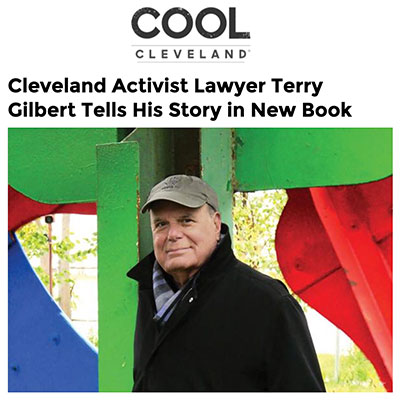
Cleveland.com
UNIVERSITY HEIGHTS, Ohio — Terry Gilbert has dedicated his career as a civil rights lawyer to pursuing justice for the disenfranchised.
“Everybody deserves justice in one form or another,” said Gilbert, who calls himself a people’s lawyer. “I was never deterred by popularity, whether people had money or didn’t have money, or whether they made mistakes.”
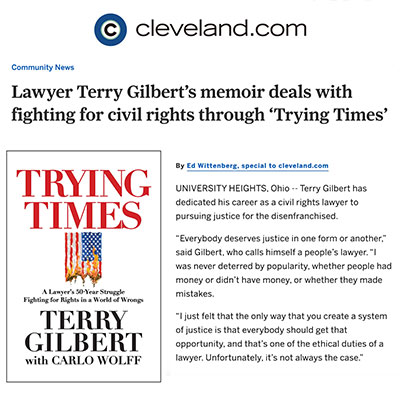
Cleveland Jewish News
As criminal defense and civil rights litigation, lawyer Terry Gilbert looked back on a 50-year career of activism and achievements, he knew his story could make a long-lasting impact as a book.
Gilbert, a lifelong Clevelander who resides in University Heights and is a member of Suburban Temple Kol Ami in Beachwood, mentioned his memoir idea to longtime friend, journalist and author Carlo Wolff, a resident of South Euclid.
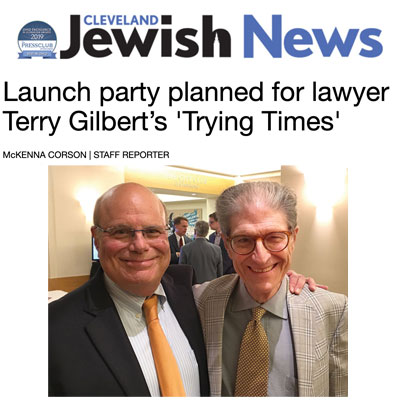
HIDE ACCORDION
Read an Excerpt
From Trying Times Chapter 8:
A chronic case
My private despair aligned with the kinds of civil rights cases I typically took on. The murders of Black men at the hands of police have been a source of professional despair throughout my career. One of these cases involved the fatal shooting of Michael A. Woods in 1982 by off-duty Cleveland policeman Joseph D. Paskvan. On the force for nine years at the time of the shooting, Paskvan had received nine police commendations—though he had been involved in seven shootings.
Paskvan was notorious for being one of the most aggressive, brutal cops in Cleveland at that time. People in the department called him The Exterminator and The Orkin Man. The circumstances surrounding the Woods shooting outraged the Black community and cemented my relationship with them by my challenging police misconduct and brutality in Cleveland. It was a troubling sign that the reputation of Paskvan was known within the police department, but the code of silence protected him.
The 24-year-old Woods was driving down Chester Avenue going west toward Cleveland when he noticed a car following him, the driver positioning his car to be near Woods as he changed lanes. The other vehicle stopped to the left of Woods, who was in the curb lane, at the traffic light at East 66th Street and Chester. The driver was officer Paskvan, off-duty and not in full uniform. Paskvan pulled out a gun, pointed it at Woods, and shot him in the head. Woods’s vehicle went over the curb near a fire station. When the police showed up, they claimed to have found a gun in Michael Woods’s car, near his body. Paskvan had claimed that Woods pointed a gun at him. Paskvan was cleared of any criminal wrongdoing. He was suspended for five days for carrying an unauthorized weapon, the 9mm automatic pistol he used to shoot Woods.
A witness stopped behind the cars at the light saw Paskvan point the gun at Woods and fire. We believed that the gun in the front passenger area of Woods’s car had been taken out of his trunk and planted. Woods’s body was in the car for hours after the shooting and the police were there for hours also; my assertion was they spent that time figuring out how to protect Paskvan.
There also was evidence that Woods and Paskvan knew each other and that both might have had a relationship with the same woman; this wasn’t a random event. It was clear there was animosity between the two, and Woods knew some things about Paskvan that Paskvan did not want revealed.
The Woods family retained me and we ultimately filed in federal court on the basis of a violation of the Civil Rights Act of 1871 (also known as Section 1983). That provided a remedy for people who had their constitutional rights violated by those acting under cover of law—including the police and any other government representative. It’s a very broad law that hadn’t been used much in the last 100 years; a dedicated group of progressive lawyers around the country began to see this particular statute as a recognition of rights violations. Its first use was mainly in the context of prisoners’ rights; then it started to be used to hold accountable police who violate the Bill of Rights and commit illegal searches and seizures, or take a life without due process.
This was the first really big police shooting case in Cleveland. There hadn’t been many before, though there were rampant police shootings and misconduct in Cleveland dating back to the ’60s and into the ’70s. The idea of being able to sue a cop for shooting somebody in the line of duty was for the most part unheard of, and even if such cases were taken on, the odds of getting anywhere in the court system were extremely low. There were no videos or cellphones; the police version of events was accepted as the truth. In one case, the late federal judge John Manos, known for his stern, authoritarian style, told me in chambers that I had a lot of nerve to file such a case.
There I was, taking on the entire Cleveland police department. I was consumed by this case because it fit right into my evolving views about the relationship between the police in America and the Black community.
Based on my knowledge of the Glenville and Hough riots, it seemed that the Cleveland police department was permeated with White racists. This was my first foray into challenging police misconduct and corruption. I did this on my own, feeling my way through—and worrying about my personal safety. Police and their supporters slandered me and I was subjected to glaring media attention, including many critical letters to the editor. Although progressives and Black activists regarded me highly, the court system, the legal establishment and the police community were upset and angry.
Many important facts emerged from handling this case. We learned that Paskvan had been in the Marines in Vietnam and was involved in over 100 firefights. He came back from Vietnam scarred but nevertheless was immediately hired as a patrolman and sent into the worst neighborhoods in Cleveland. During my deposition of him, I remember him getting into the Vietnam portion of his life. It seemed to me that Paskvan saw the inner-city community as a war zone where Black people were like the Vietcong and their lives weren’t worth much; if they got out of hand, he thought, he had the right to do whatever he felt was justified. There was a long list of cases and incidents involving his beatings of young Black people. He was never properly psychologically screened when he joined the police department; it accepted Vietnam War survivors because the police considered them heroes—and if they did nasty things like Paskvan did, they’d overlook it. There was no accountability, no disciplinary process, and the racist police union backed them up.
The Cleveland Law Department represented Paskvan, and the case dragged on for a number of years. The city justified the shooting, finding that Paskvan did not violate any rules or procedures, and we faced an uphill legal battle; there were efforts to keep the case from even getting a trial, and judges applied pressure to settle it. What we believed happened and what we could prove were two different things. Police were covering for Paskvan, the investigation was one-sided, and there was little in the way of forensics. So we did settle—for $50,000; back then the idea of a jury going against a cop, combined with the difficulties of the case from an evidentiary standpoint, made settlement suitable. Today, the public is far more receptive to finding police accountable. Still, that $50,000 wasn’t anywhere close to what the family deserved.
The Woods case created an activist movement around police issues, including the formation of People United Against Repression, or PUAR. PUAR spearheaded a push for reform, and we mounted a petition campaign in Cleveland to change the city charter to create a civilian review board. We wound up creating just such a board, which was accepted. It evolved into a panel, which is still in place, that includes citizens and some police. It was a very positive development and gave us hope, even though it did not have the kind of power we wanted. Board members were only able to make recommendations. PUAR no longer exists.
The second after-effect of the Woods case is that public opinion ultimately came to haunt Paskvan. After all these complaints piled up, the city took steps to terminate him. In 1994, he sued Cleveland for passing him over for promotion, Paskvan asserted, because he was White. Paskvan was awarded $200,000—four times what the Woods family received for Michael Woods’s death. It was another reminder of the disparity between being Black or White in America, and between being a police officer or a civilian.


